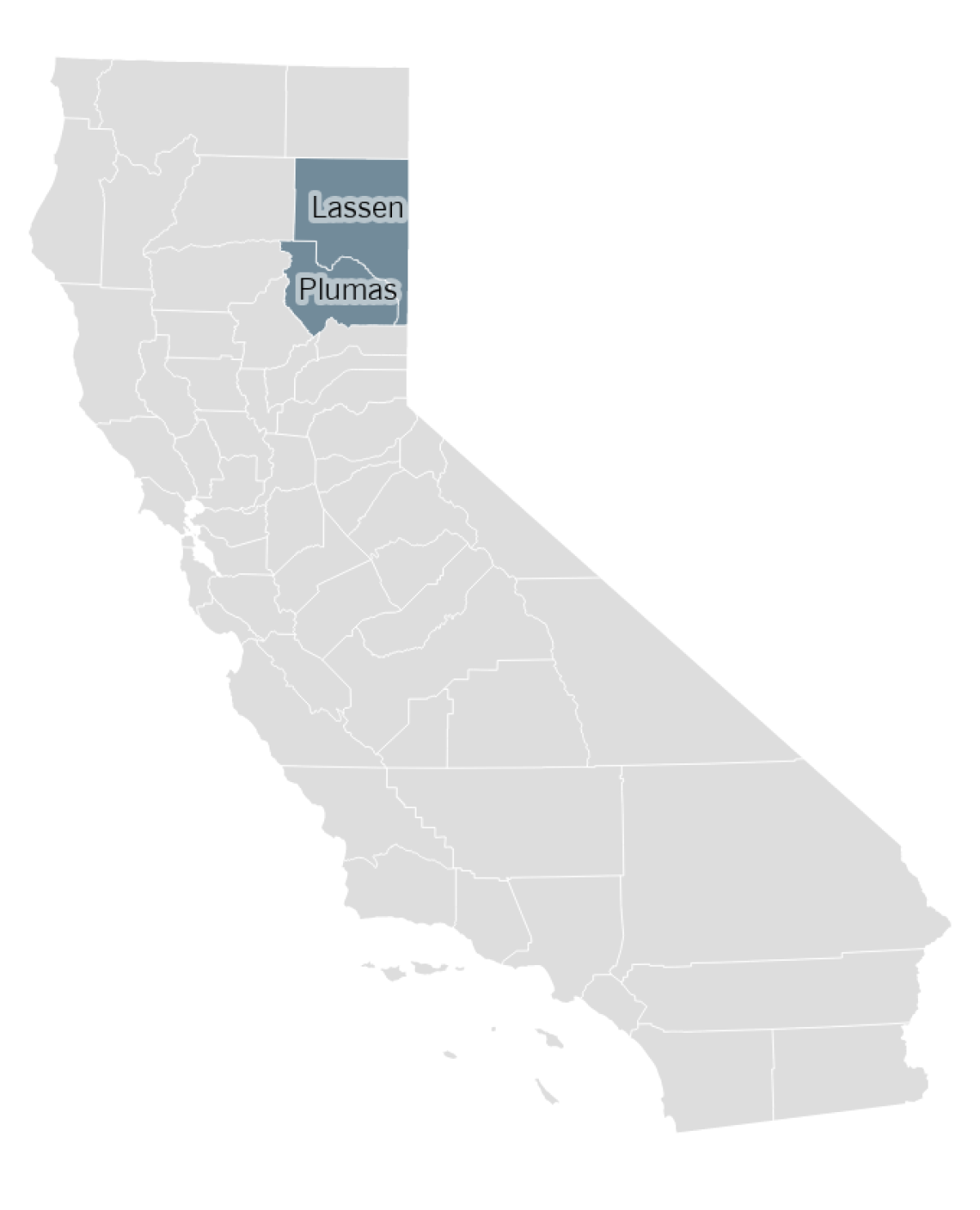In rural Northern California, pandemic crushes newspapers that delivered news and warmth during winter cold
- Share via
Eight days after the first case of the novel coronavirus was confirmed in rural Plumas County, something happened that sent shock waves through the small health department trying to keep people updated during the pandemic.
The publisher of all four of the Northern California county’s newspapers stopped the presses.
The Plumas County Public Health Agency had relied on them to provide residents with information about COVID-19.
“It’s been difficult trying to provide information about the pandemic ... Unfortunately, not having a newspaper makes a difference,” said Lori Beatly, a spokeswoman for the health agency.
In this region where winter can be brutal, the papers published by family-owned Feather Publishing did more than deliver the news — they literally kept people warm. Sold in bundles, they crackled aflame in wood-burning stoves.
“You get people upset about the content, and you get the people who worry about how they’re going to start their fires,” said Debra Moore, managing editor of the Plumas County newspapers. “It’s a big, big deal. We’ve had people come in to stock up in case we don’t start printing again.”
Based in the Gold Rush town of Quincy, Feather Publishing stopped printing its Plumas County papers, as well as the only two newspapers in Lassen County, in early April. Like many other news organizations, it has been battered by staggering losses in advertising with businesses closed.
Now, there is one editor working in each county, updating their websites about COVID-19.
“We’re primarily the only game in town; that just made the decision that much more difficult,” said publisher Mike Taborski, who runs the business with his wife, Keri, whose parents ran it before them. “It was extremely painful, both for the impact it was going to have on the community, to shutter their only means of getting local, reliable news, and the impact it was going to have on our family of employees.”

The loss of a newspaper in the midst of the coronavirus outbreak has been especially painful in a mountainous region with a population that is generally older, more geographically isolated and has less access to reliable cellphone service and the internet than urban locales.
In Plumas County, 28% of residents are 65 or older — double the state average. Senior citizens face the greatest risk of contracting the virus.
After the Feather River Bulletin, the Indian Valley Record, the Portola Reporter and the Chester Progressive stopped printing, the health agency sent postcards to every county resident detailing COVID-19 symptoms and stay-at-home orders.
“It was very expensive and time-consuming,” Beatly said.
Some people who would otherwise read the weekly newspapers now call the county’s coronavirus phone line every few days for updates.
Perhaps the saving grace has been that the virus has spread more slowly in the vast, sparsely populated northern reaches of California. As of Thursday, Plumas County had four confirmed cases of COVID-19. Lassen County had none.

Officials from a growing number of rural Northern California towns and counties have called on Gov. Gavin Newsom to let them reopen their economies. When a Quincy barber opened this week, one of the first customers was Plumas County Supervisor Jeff Engel, who posed for a photo in an American flag barbershop cape while a masked man trimmed his hair.
With some 75 employees, Feather Publishing is one of Plumas County’s largest employers. The publisher laid off all but two.
Feather Publishing’s Lassen County Times and Westwood Pine Press were the only two newspapers in Lassen County. Sam Williams, their managing editor, is now the only person on the payroll there.
Williams has been with the company for 21 years. His wife, head of the graphics department, had been there for 31 before being laid off.
“We’re hoping we will return when all this craziness is over, but there’s no guarantee,” Williams said. “You’ve got a six-newspaper chain. That’s a big ship to push back in the water.”
Over the last 15 years, the U.S. lost one in four newspapers — some 2,100 — as the internet became a primary source of information, said Penny Muse Abernathy, a University of North Carolina professor who studies news deserts.
The communities that lost newspapers, many of them rural, had a disproportionately high poverty rate and never fully recovered from the 2008 recession, she said.
“The tragic part about that is these are the very communities that need the kind of information that a local newspaper provides,” Abernathy said. “If you lose your local newspaper, and you’re in a small or mid-sized community, nobody’s showing up at the local school board meeting. Nobody is covering local team sports. Nobody is covering everyday life.”
With no newspapers in Plumas and Lassen counties, all of the counties’ legal advertisements — the legally mandated notices of public hearings and other government business — now are sent to the nearest publication, the Mountain Messenger in neighboring Sierra County, said owner Carl Butz.
The Messenger, for which Mark Twain once wrote, is the state’s oldest weekly newspaper. It has been printed on the Feather Publishing press in Quincy for the last four decades.
Butz bought the Messenger in January, saving it from closure. After the Los Angeles Times wrote in December about the newspaper’s probable closure because of previous editor-publisher Don Russell’s struggle to sell it before retiring, subscriptions increased 20%, Butz said. He now mails copies to people in 36 states.
The Feather River Bulletin in Plumas County, a dutiful chronicler of the times when logging and gold mining reigned, has been around in some form since 1866. It never missed a week of publication before last month.
One former publisher, Felix Grundy Hail, was convicted of manslaughter after shooting an attorney on Main Street in Quincy in 1913. Hail, whose wife was on the school board, had bickered with the attorney over the proposed location of a new high school and the attorney’s rejection from the local Masonic Lodge. After the shooting, Hail’s son took over the newspaper.
Mike and Keri Taborski, both 68, have worked for the papers since 1974. When the Taborskis were in high school, they hung around the press room, back when Keri’s parents were the publishers.
Taborski said that while the paper had lost employees through attrition in recent years, he was proud of never having to do layoffs. Stopping the presses, he said, was a gut punch.
“Us being at the helm and having to be the ones to make that decision was awfully hard,” he said.
Some 86% of Feather Publishing’s income came from local advertising, he said. Those ads evaporated during the pandemic.
“I am the eternal optimist. Always have been about our industry,” Taborski said. “Always felt community newspapers would be alive and well for many decades to come. This completely caught me by surprise but opened my eyes to how fragile we are.”
It’s hard, he said, coming to an empty newsroom every day. Sometimes, laid-off employees pop in to use the internet and “look at their desk.”
Managing editor Debra Moore, who now runs plumasnews.com alone, took her first job at the paper in 1993, covering lighthearted news and earning the nickname “Fluff” from a crime reporter. Her license plate reads LUV NEWS.
A few weeks ago, she assigned a reporter to pore through century-old newspapers to research how the 1918 Spanish flu affected Plumas County.
The fact that there will be no physical archive of this pandemic has hit her hard.
After the papers stopped, the phones rang nonstop. Callers wept.
More to Read
Sign up for Essential California
The most important California stories and recommendations in your inbox every morning.
You may occasionally receive promotional content from the Los Angeles Times.











